My baby died. Please ask me his name
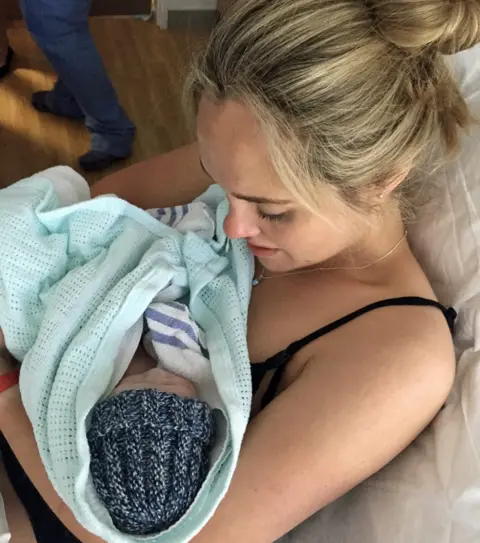 BBC
BBCThere is no word in the English language for a parent whose child has died, as if the subject were too painful for society to confront. Elle Wright lost her son Teddy soon after he was born and wants to challenge the idea that a person can only be considered a parent if they have a living child.
My son Teddy would have been three next spring, but he never made it home from hospital - he died at three days old. When it happened I found myself catapulted into a kind of motherhood I had never expected.
I found out I was pregnant in September 2015, after about 10 months of trying. I remember waiting for my husband Nico to get home to tell him the news. I placed the positive pregnancy test in his hands and when he opened his eyes I saw the expression change on his face as the penny dropped. He beamed, and I cried. I never thought anything could have topped our wedding day for that feeling of elation.
We waited until our first scan at 12 weeks to tell people the news. I couldn't quite believe it myself until I saw our baby floating on the sonographer's screen - kicking and wriggling, so full of life. I dropped my husband off at work after and he sent me a text a little later. "This is the greatest Monday morning ever. I wish all Mondays could feel this good."
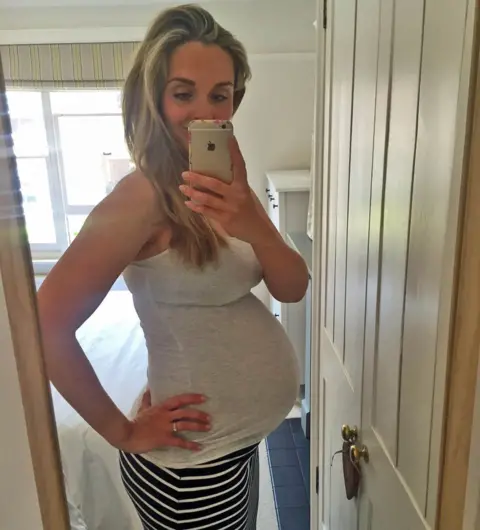
Fast forward six months and for a few brief moments I held my new baby boy in my arms.
He was silent - and he felt so tiny.
Immediately a midwife whisked him away. I was left to deliver the placenta, my anxiety mounting. But before long Nico re-emerged, followed by a smiling consultant holding our son. He was bundled up in hospital towels and wearing what can only be described as a blue fisherman's hat.
The consultant explained to us that our baby had had a little trouble "getting going" but was now breathing and stable. In his knitted hat he looked like he was about to head off on a deep-sea excursion. Little did we know he would soon be off on another journey, after spending just 74 hours on this Earth.
We decided to call him Teddy. His full name would be Edward Constantine - the middle name Constantine sprung from our love of the Constantine Bay on the North Cornish coastline. I dreamt of watching Teddy taking toddler steps towards the surf on our favourite beach there.
Teddy and I went to sleep that night in a ward with other parents whose babies had needed extra care at birth. But about two-and-a-half hours later I was woken up by a midwife urgently shaking my shoulder. Her words were: "I've got to take him, he's really cold." I saw his little arms just flop down by his side as she lifted him out of his crib. He had stopped breathing and nobody knew for how long. It took 18 minutes for him to be resuscitated and we later found out that the damage that had been done to his brain was irreversible.
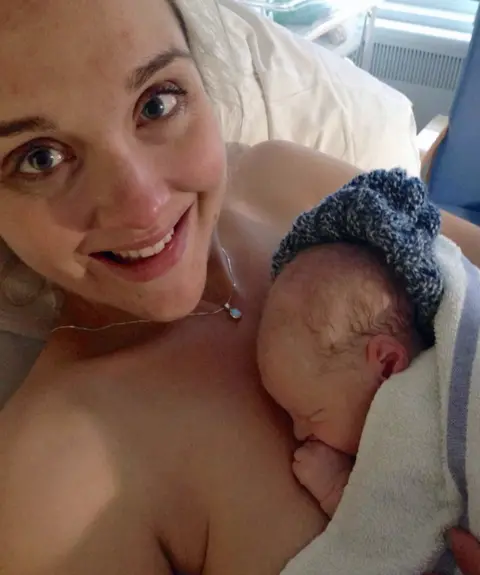
Teddy was transferred to a specialist intensive care unit at another hospital and a professor from Great Ormond Street got involved. All the while my body was still behaving like a new mum. The day we found out Teddy's life support was going to be switched off was the day my milk properly came in. Mother nature at its cruellest.
I don't think I could ever describe how it felt to find out there was nothing anybody could do for Teddy and that he would die that day. I felt as though every last breath had been kicked out of my chest - as if a wave had pulled me under and no matter how hard I kicked, screamed or struggled, I was never coming up for air.
Teddy was born on 16 May 2016 and he died on 19 May, from a very rare metabolic condition called 3 methylglutaric aciduria (3MGA). It meant that everything was poisonous to him, even the air he was breathing as soon as he was born. My body had been keeping him alive which is why for a short time I got to meet Teddy, to hold him and smell him and feel the warmth of his skin on mine.
The hours leading up to our final goodbye with Teddy felt as though they moved in slow motion. We finally got to take him out of the tank he'd been in and cuddle him skin on skin. His grandparents held him close for the first time and we took our only photos as a family of three, Teddy, Nico and I. When it was time I sat on a sofa in a private room flanked by Nico and my mum. The nurse stopped pumping air into Teddy's lungs and removed the final pieces of tape from around his mouth and handed him to us.
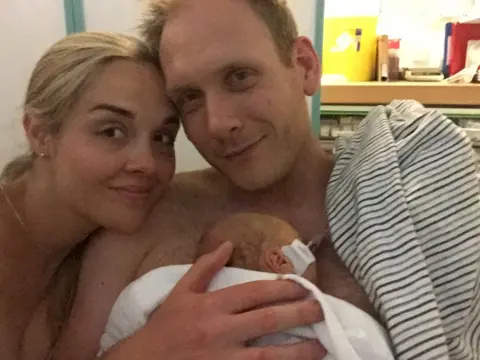
Finally, he was free from all those wires, all those beeping and buzzing machines. As he took his last gasping breaths we read him a story, Guess How Much I Love You? I got lost in the words as I tried to memorise every last detail of his perfect little heart-shaped face, and the weight of him in my arms. As his tiny breaths stopped I didn't feel scared; I wanted him to feel safe and to know we loved him. That's what a mother does, isn't it? Forgets her own feelings to protect those of her children. But I think I felt my heart physically breaking in that moment; at least, that is the only way I can describe that feeling.
After this sudden loss, I felt numb both physically and emotionally. "Things like this happen to other people," I remember thinking. I sent a few messages to a few friends and explained we had had to say goodbye to Teddy. I couldn't manage to say "he died," or "he's dead." It took a few months before I could say or write those two words together: "'Teddy died."
We arrived home to a pram in the hallway and a Moses basket set up in our bedroom. Nico hid them behind the old oak door of the nursery. I couldn't step foot in its direction down the hallway. I could see the cracks of bright light shining through the nursery door, showing me what was missing from my life on the other side of it. A life I had spent nine months preparing for but was now shut out of.
The phone in the house and our mobile phones felt as if they were ringing off the hook. The best messages I got in that time were the ones from friends which simply said: "I'm here for you when you need me and I want you to know I love you." They didn't demand a response and I knew they'd be there when I was ready to face the world.

Help and support

Six days after Teddy died we had a visit from a bereavement midwife. Before she arrived I forced myself to have a shower, put on some clothes and do my make-up. I greeted her with a smile at the door and brightly asked her if she'd like a cup of tea.
I think she thought I'd totally lost it. I quickly realised that speaking to her about Teddy wasn't going to be very useful for me. She hadn't even bothered to learn his name. He was just another baby who had never made it home. I went out of my way to show her photographs of him, to show her who he was. She seemed to just want me to sit and sob instead, but I had done that for six days straight and I was exhausted. She wanted us to conform to a text-book way of grieving. I politely declined to see her again.
This was compounded by a phone call I received from my obstetrician's secretary asking me if I wanted to make an appointment to discuss the delivery of my baby. "I had my baby, last week, and he... he died," I managed to stutter. There was silence on the end of the line and a garbled apology. A follow-up letter arrived a few days later which read: "I am very sorry to hear about the unfortunate outcome of your pregnancy." Teddy had apparently become an "unfortunate outcome", rather than a person, my son.
The thought of seeing people or telling people what had happened made me feel sick and I went into hiding for a good six weeks, seeing only family and a few very close friends. One person I did choose to meet, however, was a fellow expectant mother I had met at a yoga class and whose baby had been born in the same hospital as Teddy a day later.
We went for a coffee and I met her sweet, beautiful newborn. I felt a lurch of jealousy but I told it to shut up; I didn't want to be that person. She was kind and patient as we chatted about our experiences over those first weeks - both very different stories of being a new mum. I cried a lot, but tried my best not to be an utter raincloud of emotion.

You might also be interested in...
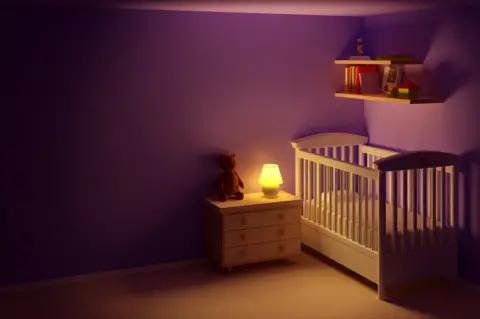 Getty Images
Getty ImagesStand-up comedian Lou Conran had to end her pregnancy at 22 weeks - five-and-a-half months. She did a show about the experience for the Edinburgh festival, hoping this would encourage people to talk about a subject that is often covered in a blanket of silence.

"When are you going back to work then?" she suddenly asked. And just like that, when I thought I was talking to someone who might get it, I realised I wasn't. A bit more chit-chat and we went our separate ways. We didn't meet up again, although I did see her about six weeks later on a hot August day when I was walking my pug Boris through the park.
She was bouncing her baby on her hip in the middle of a group of happy mums with their new babies. I took a deep breath and steeled myself to go over and say hello, to face my worst nightmare of a mum and baby get-together. But in the moment she saw me, she turned her back away so that she was facing the group. "That's Elle, who I was telling you about," I heard her say when she thought I was out of earshot.
I could feel their eyes burning into the back of my head. I felt as though I had been well and truly, unceremoniously kicked out of the Mummy Club. You can't sit with us, because your baby died. I cried all the way home.
Then I found the friends I never knew I needed. By chance I saw an Instagram post by a bereaved mother, Michelle. Michelle had a daughter, Orla, who had been stillborn in May. As I read her words I realised she too was planning new routes to places, avoiding places with prams and pregnant women and wearing sunglasses at all times to mask the tears, I thought, "Thank God, I am not alone."
We exchanged messages of solidarity and she told me that her and a few other "loss mums" were starting a WhatsApp group for support - all had lost babies in recent months.
It was like blind dating for the ultimate anti-NCT group, and it felt so good. Michelle told me the names of the other mums in the group and I made sure I was following them all on Instagram too.
I wanted to put faces to names, to understand their stories and know their babies' names. The group was called Warrior Women, and these mums saved me in my darkest hour. There was Jess - she and her wife, Natalie, had their firstborn son Leo in January that year; Leo had been stillborn. There was Aimee, whose daughter Phoebe had died during labour in the same month. Emma had a daughter, Florence, who had died during labour in January too. And Sam, whose son, Guy, had been stillborn in November the year before.
Jess, Nat, Michelle, Aimee, Emma, Sam and Elle. The Warrior Women. I had found my tribe.
The group has been running for more than two years now. We call the babies "The Gang", we acknowledge their birthdays, and take it in turns to write all of their names together in the sand whenever any of us find ourselves on a beach.
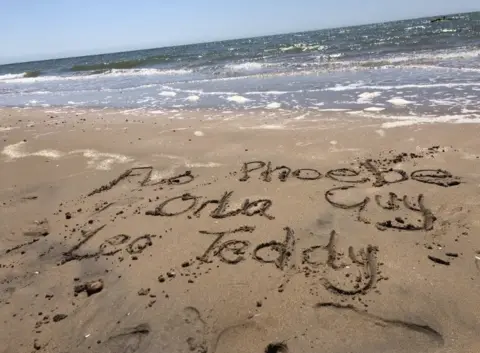
I find it cathartic to write Teddy's name. At first it was in letters to him in my notebook, but then it became anywhere I could - in the condensation of windows, in the sand of our favourite beaches, anywhere that made him feel that little bit closer. When Teddy died I became a mum who had to survive knowing that my days will never be filled with his laughter, or his "firsts".
I used to write it down in different ways in my notebook, lines and lines of just "Teddy". I would find myself wondering how he would have written it when he got old enough to write. Would he have big swirly writing like mine, or my husband's spidery writing?
As the first Christmas after Teddy died drew close, I began to deliberate over how to sign Christmas cards. I knew I needed to include our son. I settled on a little T inside a hand-drawn star, just to the top right corner of our names and I continue doing that today. Every time I write a card and put that little T in it, it makes me feel proud that we are continuing to include Teddy in our family story. I never want that T to disappear.
Allow Instagram content?
Some of my WhatsApp group women have been blessed with more babies. They fill all of our lives with the hope of better days to come. But those pregnancies have come with a new set of worries and anxieties to manage for each of them. Losing a baby will do that to you.
The Warrior Women understand that. They don't immediately shriek congratulations at the first talk of pregnancy. And, of course, we never congratulate them on being a "first-time mum", because we understand that they aren't.
There is something so unspeakably horrific about losing a child that society doesn't even have a name for it. If a spouse dies, you are a widow - if your parents die, you are an orphan. Losing a child defies the natural order of what we expect and it is just too painful a prospect to allow our minds to consider.
But where does that leave parents like Nico and me, who are mum and dad to a child that isn't alive? Where does that leave the women on my WhatsApp group and their partners? There are thousands of grieving parents walking around without much recognition or understanding from the world around them.
When people ask me if I have children I have to make a call on whether or not to tell them that Teddy died. I worry about telling them because I know it will make them feel uncomfortable. Sometimes people say things like, "Don't worry, you'll make a great mum one day." I know they have good intentions, but it's so insensitive. Just imagine if I told them my husband had died and their reaction had been to say, "Don't worry, you'll get married again and you'll make a great wife."
Allow Instagram content?
More often than not people just quickly change the subject to something like the weather. But nothing is worse than that silence. When I tell someone I have a son but he didn't get to come home it makes such an enormous difference to my day if the person says, "I'm so sorry, what was his name?" It makes me feel like my narrative of parenthood is valid and that Teddy was a person, who mattered then and still matters now.
After Teddy died I heard the phrase: you will learn to feel the love more than the loss. For me, that's exactly what saying his name aloud enables us to do. By hearing it, normalising it and acknowledging his existence, we are filling that cavernous space of loss with love.
Elle Wright is the author of Ask Me His Name: Learning to Live and Laugh Again After the Loss of My Baby
As told to Kirstie Brewer. Kirstie is on Twitter: @kirstiejbrewer
Photographs owned by Elle and Nico Wright.

